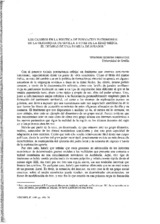Los cambios en la política de formación patrimonial de la oligarquía de Sevilla a fines de la Edad Media. El ejemplo de una familia de jurados
Autor
Borrero Fernández, Mercedes
Editor
Facultad de Filosofía y Letras. Departamento de Ciencias de la Antigüedad y Edad MediaFecha
1996Materia
Formación patrimonialPropiedad de la tierra
Explotación de la tierra
Oligarquías
Jurados
Sevilla (España)
Edad Media
METS:
Mostrar el registro METSPREMIS:
Mostrar el registro PREMISMetadatos
Mostrar el registro completo del ítemResumen
A fines del siglo XV, la introducción de nuevos miembros en el grupo oligárquico sevillano, cuando los esquemas de reparto de propiedad ya se habían consolidado, propiciará cambios importantes en la política de formación patrimonial de este grupo social tan singular como característico de la sociedad sevillana de la Baja Edad Media. En este trabajo se analiza este fenómeno a través de una familia de jurados. Con un patrimonio fundiario que ya no tiene como base el olivar y en el que se emplean nuevos sistemas de explotación, esta familia deberá hacer frente, además, a las graves coyunturas que el campo andaluz sufre en las primeras décadas del siglo XVI. Todo un ejemplo de intento de adaptación a una nueva época por parte de un grupo que siempre se caracterizó por su dinamismo económico. At the end of the XVth century the introduction of new members to the Sevillian oligarchic group, when the allocation of property had already been consolidated, is conducive to important changes in this very unique social group' s policy of inheritance formation as characteristic of Sevillian society in the Lower Middle Ages. In this essay this phenomenon is analysed through the study of a family of jury members. With an agrarian inheritance that no longer has the oliver grove as its foundation and in which new farming techniques are used, this family must al so confront the grave situations that the Andalusian countryside suffers in the first decades of the XVth century. In all, an example of the intent, on the part of a group which was always characterized by its economic dynamism, to adapt to a new period.

